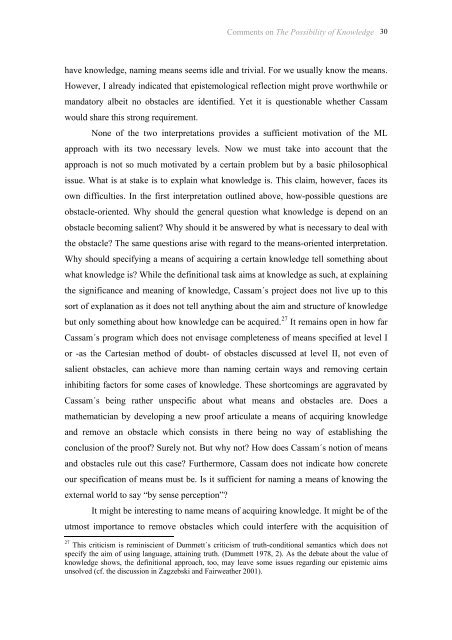Complete Issue in PDF - Abstracta
Complete Issue in PDF - Abstracta
Complete Issue in PDF - Abstracta
You also want an ePaper? Increase the reach of your titles
YUMPU automatically turns print PDFs into web optimized ePapers that Google loves.
Comments on The Possibility of Knowledge<br />
have knowledge, nam<strong>in</strong>g means seems idle and trivial. For we usually know the means.<br />
However, I already <strong>in</strong>dicated that epistemological reflection might prove worthwhile or<br />
mandatory albeit no obstacles are identified. Yet it is questionable whether Cassam<br />
would share this strong requirement.<br />
None of the two <strong>in</strong>terpretations provides a sufficient motivation of the ML<br />
approach with its two necessary levels. Now we must take <strong>in</strong>to account that the<br />
approach is not so much motivated by a certa<strong>in</strong> problem but by a basic philosophical<br />
issue. What is at stake is to expla<strong>in</strong> what knowledge is. This claim, however, faces its<br />
own difficulties. In the first <strong>in</strong>terpretation outl<strong>in</strong>ed above, how-possible questions are<br />
obstacle-oriented. Why should the general question what knowledge is depend on an<br />
obstacle becom<strong>in</strong>g salient? Why should it be answered by what is necessary to deal with<br />
the obstacle? The same questions arise with regard to the means-oriented <strong>in</strong>terpretation.<br />
Why should specify<strong>in</strong>g a means of acquir<strong>in</strong>g a certa<strong>in</strong> knowledge tell someth<strong>in</strong>g about<br />
what knowledge is? While the def<strong>in</strong>itional task aims at knowledge as such, at expla<strong>in</strong><strong>in</strong>g<br />
the significance and mean<strong>in</strong>g of knowledge, Cassam´s project does not live up to this<br />
sort of explanation as it does not tell anyth<strong>in</strong>g about the aim and structure of knowledge<br />
but only someth<strong>in</strong>g about how knowledge can be acquired. 27 It rema<strong>in</strong>s open <strong>in</strong> how far<br />
Cassam´s program which does not envisage completeness of means specified at level I<br />
or -as the Cartesian method of doubt- of obstacles discussed at level II, not even of<br />
salient obstacles, can achieve more than nam<strong>in</strong>g certa<strong>in</strong> ways and remov<strong>in</strong>g certa<strong>in</strong><br />
<strong>in</strong>hibit<strong>in</strong>g factors for some cases of knowledge. These shortcom<strong>in</strong>gs are aggravated by<br />
Cassam´s be<strong>in</strong>g rather unspecific about what means and obstacles are. Does a<br />
mathematician by develop<strong>in</strong>g a new proof articulate a means of acquir<strong>in</strong>g knowledge<br />
and remove an obstacle which consists <strong>in</strong> there be<strong>in</strong>g no way of establish<strong>in</strong>g the<br />
conclusion of the proof? Surely not. But why not? How does Cassam´s notion of means<br />
and obstacles rule out this case? Furthermore, Cassam does not <strong>in</strong>dicate how concrete<br />
our specification of means must be. Is it sufficient for nam<strong>in</strong>g a means of know<strong>in</strong>g the<br />
external world to say “by sense perception”?<br />
It might be <strong>in</strong>terest<strong>in</strong>g to name means of acquir<strong>in</strong>g knowledge. It might be of the<br />
utmost importance to remove obstacles which could <strong>in</strong>terfere with the acquisition of<br />
27 This criticism is rem<strong>in</strong>iscient of Dummett´s criticism of truth-conditional semantics which does not<br />
specify the aim of us<strong>in</strong>g language, atta<strong>in</strong><strong>in</strong>g truth. (Dummett 1978, 2). As the debate about the value of<br />
knowledge shows, the def<strong>in</strong>itional approach, too, may leave some issues regard<strong>in</strong>g our epistemic aims<br />
unsolved (cf. the discussion <strong>in</strong> Zagzebski and Fairweather 2001).<br />
30




